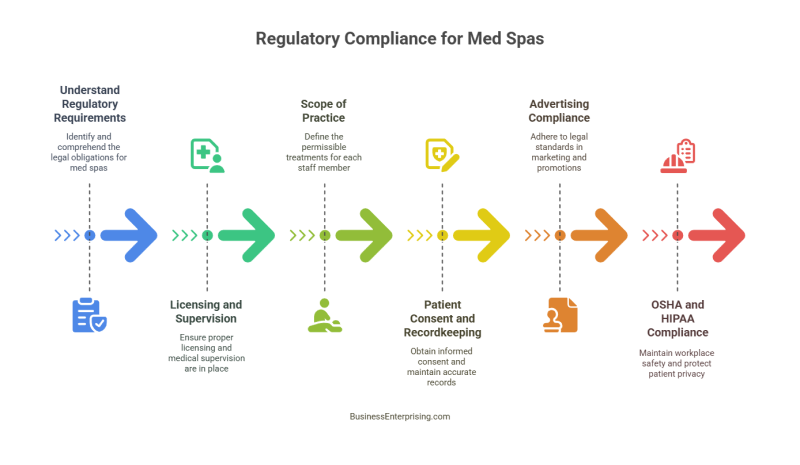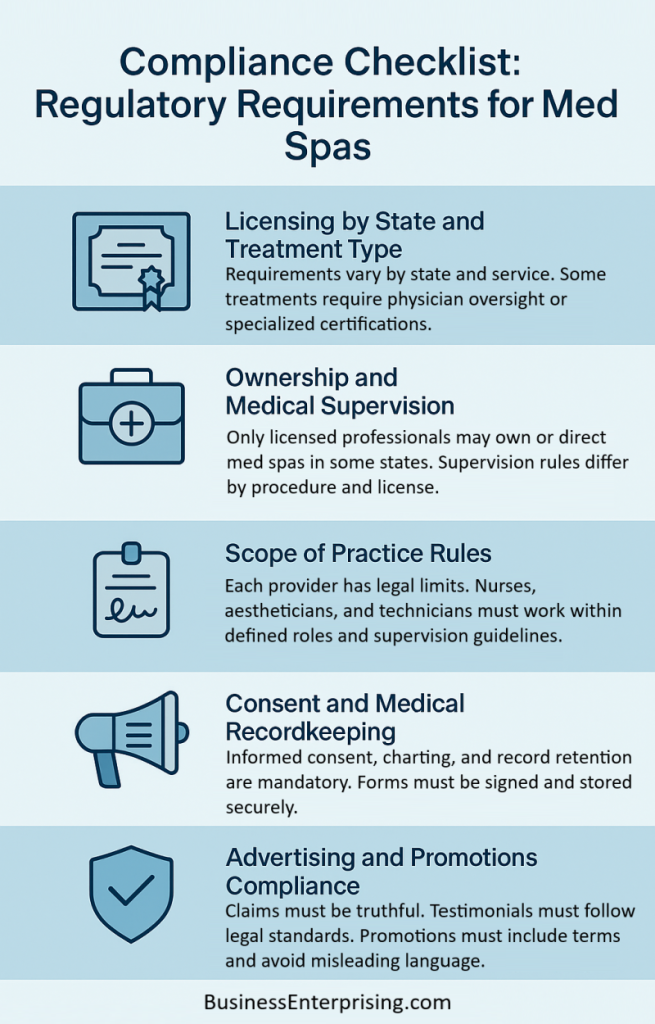
Each state has different licensing rules, staffing laws, and facility guidelines. Therefore, you need to know exactly what applies in your location. A treatment that’s allowed in one state might be restricted in another. That difference can change how you staff and manage your services.
Additionally, compliance goes beyond licenses. You must protect patient privacy, follow safety standards, and document every procedure correctly. These details may seem small, but they have major legal weight. A mistake in one area could lead to large fines or forced closure.
Marketing can also create problems if not handled carefully. You may not realize that medical claims or reviews are regulated. Therefore, it’s important to train your team on what can and cannot be said in promotions.
Furthermore, patient care includes proper supervision and consent. That means using clear forms, following scope of practice rules, and documenting treatments properly. It’s not only about results. It’s about staying aligned with healthcare laws every step of the way.
Learning these rules takes effort, but it protects your reputation and business. You can operate with more confidence when you know what’s required. Building a med spa the right way starts with understanding what the law expects from you.
Licensing Requirements by State and Treatment Type
Licensing rules for med spas vary widely depending on what services you offer and where you operate. Some states require strict oversight. Others take a more flexible approach. You need to understand both your treatment types and your state laws before launching services.
Botox, dermal fillers, and other injectables usually require a licensed medical professional to perform or supervise the procedure. However, the exact definition of supervision differs by state. Some states require on-site physician presence, while others allow remote supervision. Therefore, it’s important to confirm local rules before hiring staff.
Additionally, laser treatments often come with their own licensing process. Many states require technicians to complete specific laser safety training. Some require licensing under a medical board. Others regulate lasers through a cosmetology board or department of health. That creates different standards depending on your location.
You may also need to think about the type of facility license your med spa must carry. Some states treat medical spas like medical clinics. Others treat them more like beauty businesses. That distinction affects your inspection process and licensing fees.
Furthermore, your staff’s licenses must match the treatments they perform. An aesthetician may perform facials but cannot inject fillers. A nurse can handle certain tasks under a physician’s direction. Therefore, you need to match staff capabilities with legal scope of practice.
Keeping up with regulatory requirements for med spas means checking your state boards often. If you’re expanding across state lines, the rules can shift quickly. A compliance gap can lead to serious legal and financial trouble. That’s why planning your licensing structure early is a smart move.
Medical Supervision and Ownership Regulations
Ownership rules for med spas are not the same in every state. Some states require medical ownership, while others allow business professionals to own the entity. Before you open your med spa, it’s important to understand who is legally allowed to operate it in your state.
In several states, only licensed physicians can own medical practices. This includes med spas that offer treatments like Botox or fillers. However, non-physicians can often form a management company to handle operations. You may need a legal structure that separates ownership from medical services.
Additionally, most states require a licensed medical director to oversee medical treatments. This person must be a physician or other licensed healthcare provider, depending on state law. They are responsible for supervising staff and reviewing treatment protocols. Therefore, having the right medical director is more than a formality.
Your medical director must also be involved at the correct level. Some states require in-person supervision for certain procedures. Others allow off-site supervision with telemedicine protocols. That supervision level must match the treatments you offer and the licenses of your staff.
Furthermore, the medical director cannot be a silent figure. They must have an active role in training, oversight, and patient safety. If regulators find your director is not involved, you may face legal and financial penalties.
Meeting the regulatory requirements for med spas starts with a compliant ownership and supervision model. If you plan to expand, review the rules in each new state. Ownership laws can shift quickly. Therefore, legal structure and medical oversight should be part of your early planning, not an afterthought.
Scope of Practice for Providers and Technicians
The type of provider performing treatments at your med spa matters. Each license carries limits on what services can be performed. These limits vary by state and by treatment type. Knowing who can legally perform each procedure helps you avoid fines and liability.
Registered nurses can often provide injectables like Botox under medical supervision. However, they may not perform certain procedures without direct oversight. Some states require a physician’s order before each treatment. Therefore, you must confirm what level of supervision applies in your location.
Additionally, aestheticians play a major role in many med spas. They can typically perform facials, light chemical peels, and basic skincare services. However, they may not use devices like lasers or microneedling pens in many states. That work is usually limited to nurses or laser-certified staff.
Laser technicians are often required to complete specialized training and hold a separate license or certificate. These requirements vary widely. Some states regulate lasers under the medical board, while others do so under cosmetology or health departments. Therefore, always check how your state classifies laser-based treatments.
Furthermore, even within a licensed group, treatment limits can change depending on the specific product or device used. For example, microneedling with radiofrequency may fall under medical regulations, while basic microneedling may not. These small differences affect who can perform each service legally.
Following the regulatory requirements for med spas includes matching staff licenses to specific tasks. A clear understanding of scope helps protect your clients, staff, and business. If you expand services, review what each license allows before assigning work.
Patient Consent and Medical Recordkeeping Standards
Patient consent and recordkeeping are legal requirements you cannot overlook. Every medical-grade treatment requires clear, signed documentation before the procedure begins. This protects your patients and your business. It also helps you meet the regulatory requirements for Med Spas.
Informed consent must explain the treatment, possible risks, and alternatives. Additionally, it must be written in plain language and signed by the patient. Verbal consent is not enough. If something goes wrong, the written form becomes your legal record.
Charting is another important step. You need to document each visit, treatment details, and the provider who performed the service. Additionally, you should record follow-up instructions and any complications. These records build a timeline that shows how care was delivered.
Therefore, you need a reliable system for storing this information. Most states require that medical records be kept for several years. Some require five years, while others require seven or more. You may store them digitally or on paper, but they must be secure and accessible.
Furthermore, your records must follow privacy laws. That means using secure platforms and limiting access to authorized staff. Training your team on recordkeeping rules is also part of compliance. Failing to protect patient information could lead to serious legal penalties.
If your med spa expands, your documentation process must grow with it. More patients mean more paperwork. Having a clear system early makes it easier to scale. Regulatory requirements for Med Spas are easier to meet when your paperwork is organized, consistent, and complete.
Advertising and Marketing Compliance
Marketing your med spa comes with legal limits. You cannot make claims that sound like guarantees. Your promotions must follow medical advertising laws. Understanding these rules helps you avoid fines, complaints, and potential lawsuits.
Many states prohibit med spas from using language that implies permanent results or guaranteed outcomes. Additionally, you cannot claim a treatment cures or reverses a medical condition unless approved to do so. That includes treatments like injectables, lasers, or fat reduction. Therefore, keep your messaging factual and avoid exaggeration.
Testimonials are another area where rules apply. You may use patient reviews if they reflect typical results. However, you must clearly disclose if someone received compensation. Additionally, you must avoid editing testimonials in ways that could mislead others. Transparency protects your brand and builds trust.
Promotional offers must also be handled with care. You can advertise discounts, but the pricing must be clear and accurate. If an offer has limits, those must be stated upfront. Therefore, avoid vague language or timeframes that confuse your audience.
Furthermore, medical staff must avoid offering incentives for reviews or referrals. These actions may violate professional ethics rules or kickback laws. Your marketing team and medical director should review promotions together. That way, everyone stays compliant with current advertising rules.
Meeting the regulatory requirements for Med Spas means aligning your marketing with healthcare law. Claims, promotions, and testimonials all carry risk if handled poorly. A careful approach protects your business while keeping your audience informed and engaged.
OSHA, HIPAA, and Facility Compliance Standards
Running a med spa means following more than treatment protocols. You must also meet legal standards for safety, privacy, and facility setup. These areas affect how your business operates every day. Ignoring them can lead to serious penalties and lost trust.
OSHA standards focus on workplace safety. You must keep treatment rooms clean, store chemicals properly, and train staff on exposure risks. Additionally, you need written protocols for handling needles, bloodborne pathogens, and sanitation. Therefore, make sure your staff understands and follows these rules consistently.
HIPAA rules protect patient information. If your med spa collects health data, you must store it securely and limit access to authorized staff. Additionally, you must train your team on how to handle sensitive records. Patient names, photos, and treatment details should never be shared without permission.
Facility setup requirements can also vary by state or local code. Some states require specific sink placements, ventilation, or equipment storage. Therefore, you must review building codes and medical office guidelines before opening or expanding. A non-compliant layout could delay your operations.
Furthermore, many compliance rules require ongoing updates. Your team must refresh safety training and privacy protocols regularly. You may also need to adjust to new regulations or changes in state law.
Meeting the regulatory requirements for Med Spas means more than following treatment rules. Safety, privacy, and layout affect your business daily. Taking time to build systems in these areas helps you stay open, stay legal, and stay trusted by your clients.
Conclusion
Operating a med spa means following more than clinical standards. You must also manage licensing, supervision, and staff qualifications carefully. Each decision you make has legal and operational impact. Therefore, staying informed is one of the smartest things you can do for your business.
Additionally, you need to keep records in order and stay compliant with data privacy rules. Even your advertising must follow legal guidelines. Every part of your operation connects back to local or federal laws. That includes how your space is built, how your team trains, and how you protect your clients.
Regulations vary from one state to another. What works in one city may violate the law in another. Therefore, regular reviews of your systems and procedures are essential. Compliance is not a one-time task. It’s an ongoing part of managing a safe and legal business.
Furthermore, your team plays a big role in this process. Training and communication keep everyone aligned with the rules. This helps you reduce risk and build trust with your clients. A well-trained staff supports consistent service and avoids avoidable mistakes.
Meeting regulatory requirements for Med Spas takes time, planning, and oversight. However, it positions your business for growth and stability. When you build on a solid foundation, you face fewer surprises and make smarter choices moving forward.



